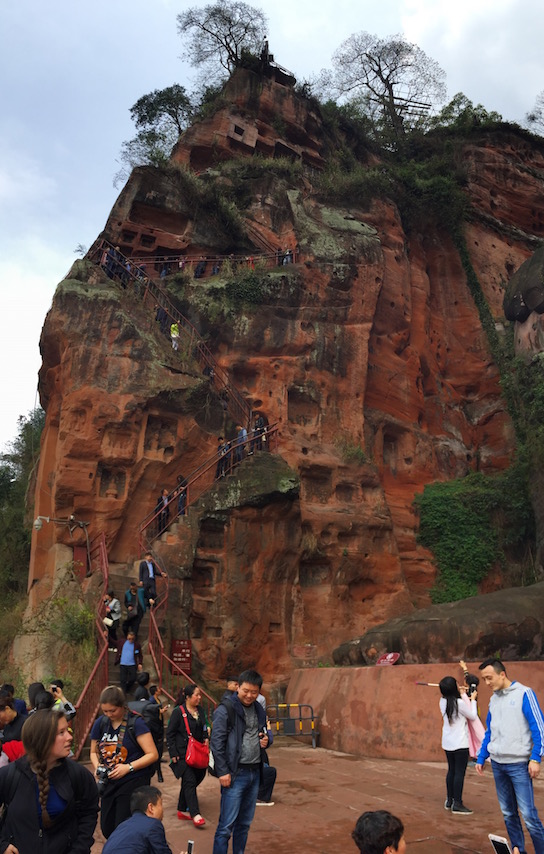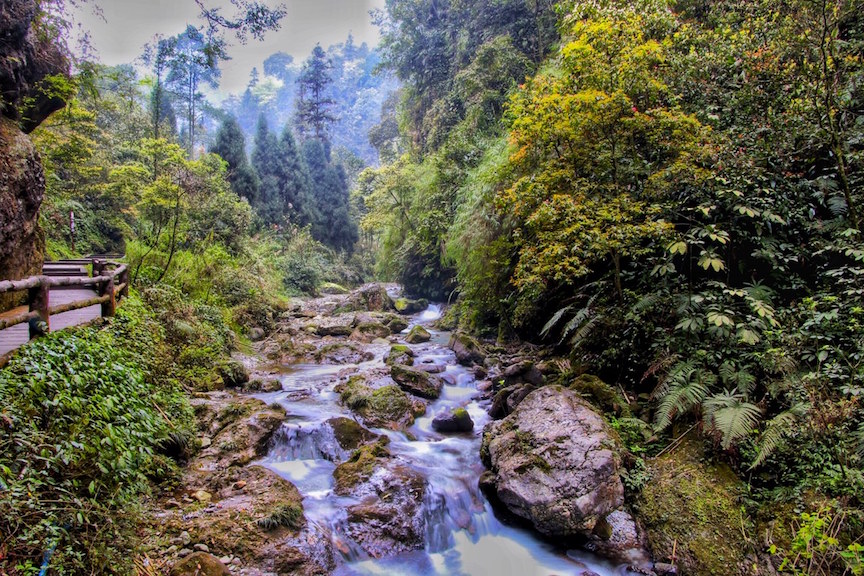
A snowy covered traditional Chinese-style building in Emei shan
After competing our first of three months at the panda base, we recently enjoyed a weekend getaway adventure to the Mount Emei Scenic Area.
Our first stop was the Leshan Giant Buddha, the largest stone Buddha in the world. It stands 71 meters tall and was built during the Tang Dynasty. To get to the bottom of this massive statue, we had to descend down a heart pumping, vertigo-inducing stairwell where we were sandwiched between the cliff face and the guard rail which kept us from falling into the river below. From there we could gaze upon the wonder of the giant Buddha.

Leshan’s Giant Buddha

The winding staircase that we took to get to the foot of the Leshan Giant Buddha

We spent the rest of our first day exploring the area surrounding the giant Buddha. We hiked through gardens and forests to hill top monasteries, enjoyed beautiful landscapes, and even played dress up. It was an active, exciting first day!

A very scenic bridge between the mountains

We just had to try wearing traditional cultural attire – “When in China . . .”
After catching a van to Emei Shan an hour away, we settled into our hostel and prepared for the exhausting day ahead of us–hiking Mt. Emei.
Mt. Emei is the location of the first Buddhist temple built in China in the 1st century CE. The site has seventy-six Buddhist monasteries of the Ming and Qing period, most of them located near the mountain top (Wikipedia). To hike the entire mountain, it takes at least 3 days…and we had one. So we had to make it count!
We awoke at dawn to catch one of the earliest buses up the mountain. It would be two hours before our bus reached its highest stop, and when we finally arrived we were welcomed by an unexpected sight: snow.

Prayer flags near the top of Emei Shan
Suffice to say, we were not equipped for a mountain carpeted in a winter wonderland, and soon succumbed to purchasing the 20 yuan janky metal shoe spikes that the mountain marketers were selling to unprepared travelers.
After that we were on our way to the golden summit. After about 30 minutes of hiking up snow and ice covered steps, we reached the cable cars that would take us nearly to the summit. To save two hours in our limited day, we opted for the cable ride up with the intention of hiking back down. Once off the cable cars, it was another 40 minute hike up to the golden summit. And what a sight it was!

The view looking toward the Golden Summit.
At the summit, our eyes feasted upon the snow capped stairway leading to a giant golden statue of Samantabhadra mounted atop a ring of elephants. Samantabhadra is revered as the patron bodhisattva of the monasteries associated with Mount Emei. In addition to the magnificent statue there were temples dripping icicles and people lighting incense to give their prayers.

At the Golden Summit with Samantabhadra statue

On the back side of the summit the mountain appeared to drop into a sea of clouds that seemed to stretch to infinity. This was perhaps the most breathtaking view.

The famous Sea of Clouds from the Golden Summit

As we began our hike down, we realized that the melting snow was making it exceedingly hard to find our grip on the steps. After witnessing multiple people slip down entire flights of the slushy stairs, we decided we would take the cable car back down, instead of hiking the 2km of snow covered steep trail down to the bus station.

A portrait of one of the Rhesus macaques on Emei Shan.

Rhesus macaques on Emei Shan.
On our way were were greeted by a small troop of macaques leaping through the trees. Once back on the bus we relaxed for a little over an hour until our stop: the Wannian temple.
It would be a long hike before we reached the Wannian temple and would then continue to the Monkey Forest (one of the most anticipated portions of our journey).

Wannian temple

Winding stone staircases lead you through Mt. Emei
After what felt like a million staircases winding through lush forest we found our way to the Monkey Ecological Reserve. The area was beautiful, with a small river winding between the mountain, moss covered stone scenes, and even a waterfall. Criss-crossed with suspension bridges and rickety stairways, it seemed akin to a jungle gym play land. Unfortunately, the monkeys were less active this late in the afternoon, and stayed in the trees just out of reach from the tourists yelling for their attention.

The Monkey Ecological Reserve area on Emei Shan is characterized by a criss-crossing bridge system.

Breathtaking imagery in the Monkey Ecological Reserve area.

A scenic waterfall on the hike through Emei Shan
After this escapade it was time to race back down to the bus stop to catch the last bus back to our hostel. We made it just in time for the bus, and when we returned to our hostel, our beds proved to be just what we needed to rest our sore bodies after an incredibly exciting day exploring Mount Emei.
What an awesome trip!
-Ari


